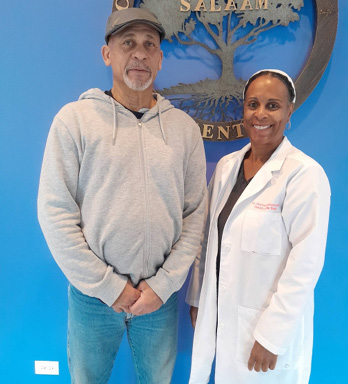CHICAGO—In late September, Steven Wright, 65, of Chicago, experienced a near-fatal cardiac attack due to heart failure inside a south suburban Walgreens, located minutes away from Chicago. On this day and at the same time, Dr. Patrice Muhammad, an integrative health practitioner, visited this Walgreens, and while there noticed Mr. Wright in distress.
“I encountered Dr. Muhammad at the end of my life cycle. I was about to leave (pass away),” Mr. Wright said. “Dr. Muhammad said no, not yet and she decided that I was not going to leave. I am grateful to her for that, otherwise I would not be here.”
Mr. Wright continued: “I had swelling or fluid buildup in my legs, so I wanted to get that checked out. I didn’t know what was going on, but I had a premonition to go to Walgreens. Something told me to find a reason to go to Walgreens, so I went there seeking a COVID test. Unfortunately, I don’t have much recollection of that day, however, I remember getting off the bus and walking into Walgreens and went to the pharmacy area. This took place on September 26, and I woke up several days later in the hospital.”
Heart disease is the leading cause of death in the United States, according to the Centers for Disease Control and Prevention (CDC). In 2019, Black adults were 30 percent more likely to die from heart disease than White adults, the CDC reported.
The American Heart Association (AHA) states that around 60 percent of Black adults have heart disease. According to their website: “Heart disease is the No. 1 killer for all U.S. adults, and stroke No. 5 killer and a leading cause of disability. As frightening as those statistics are, the risks of getting those diseases are even higher for Black people. Historical and systemic factors play a major role in these statistics. Among them are adverse social determinants of health, the conditions in which a person is born and lives. The determinants include lack of access to health care and healthy foods, and other societal issues.”
Mr. Wright said he is an avid walker and bike rider; however, he is slowly making changes to his diet.
“I met Mr. Wright on the morning of September 26,” Dr. Muhammad said. “I had gone to Walgreens to pick up something for my mom before I boarded a flight, later that day. When I saw Mr. Wright, he appeared to be snoring, he was making a loud sound and I looked over at him. I was sitting in my chair about six feet from him. The second time he made a sound, it was very loud, and when I looked at him, I saw his head was tilted to the left and he was moving a little. I realized he was not snoring, and I went over to him and asked him if he was okay, repeatedly.”
Dr. Muhammad is a board certified physician associate with 30 years of clinical experience in various fields of medicine and a doctor of integrative medicine for 18 years. She received her doctorate at Capital University of Integrative Medicine in Washington, D.C.
Dr. Muhammad continued, “He was staring to the left and now he was not snoring as loud, but he was trying to make sounds. So, I ran about five to six feet to the photo area and I asked a lady who was in the photo area to call 911 because I think he’s having a seizure. Once I returned to Mr. Wright, I shook him and asked him again if he was okay, and he began to heave as though he was going to vomit. The lady that was in the photo area, called 911 and came over to us, so she and I moved him to the floor because at this point, I suspected he was having a heart attack because he was sweating.”
Once they put Mr. Wright on the floor, Dr. Muhammad said she noticed he was still breathing, but his breathing had slowed down. At this point, a police officer arrived and Dr. Muhammad said she informed him of the emergency situation. Dr. Muhammad conducted a sternal rub, which should have caused Mr. Wright to react from the pain, but there was little reaction and his breathing slowed down even more. Dr. Muhammad said she immediately started administering CPR and checked his pulse. The police officer brought in an AED (automated external defibrillator) machine and took over the CPR, until Mr. Wright was transported to the hospital.
Tuesday Devin of Wheaton, Illinois, is a sister of Mr. Wright and she said she was grateful her brother received help.
“I am immensely thankful and grateful for Dr. Muhammad,” she said. “Her tree was bearing good fruit; meaning even though she was not on duty or on the job, she was still alert and went into action. She could have ignored him and brushed it off as my brother being asleep. She noticed that he was making loud snoring sounds and he didn’t look well, and she cared enough to assist him. She was his guardian angel and I thank her.”













